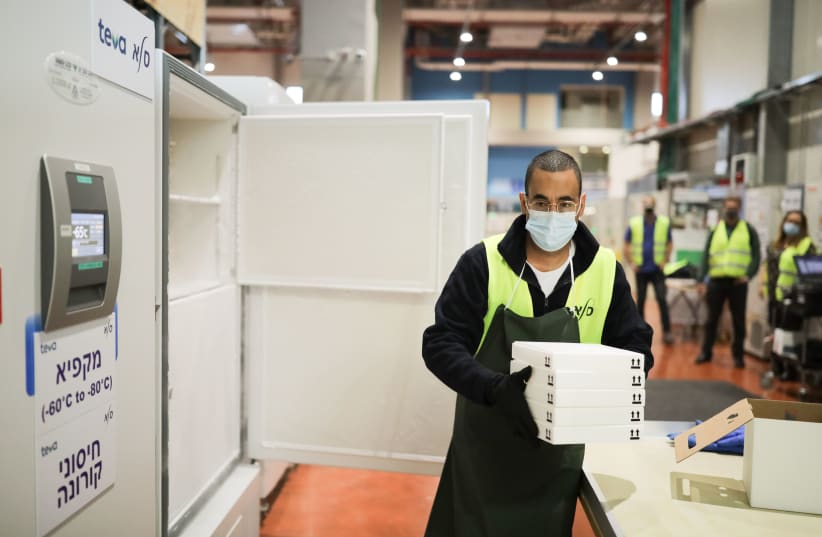Are you responsible for the operation?
Me and my colleagues are in charge, yes.
How does it work? Who is the commander of the event? Yesterday we heard the minister say that hospitals that do not vaccinate according to the order of priority will not get vaccines. Because what makes it successful, correct me if I am wrong, is the amazing infrastructure of the HMO and public medicine. Who is the commander of it? How is it incorporated?
This is generalized under the guidance of the minister of course, the director-general of the Health Ministry and some very dear people who run it. Also, logistically, [it is] committees dealing with the medical field: the immediate response to issues.The matter is very simple: Given the great infrastructure we have, there is a certain amount of vaccines. If we want to reduce the infection rates and mortality of the critically ill patients who need to be hospitalized, we need to vaccinate according to the groups that commonly get sick with complications – and therefore we need to prioritize these populations. So at the beginning of dealing with this thing more than a month ago, we set up a committee whose whole function was to sit and prioritize people medically.
Who is vaccinated at the moment?
We are at the end of the vaccination of the medical teams, both at the HMOs and in the hospitals.
What percentage is getting vaccinated?
At the moment, in hospitals the vaccinations are from 60%-70%. We want to vaccinate those 60 years old and older who are prone to greater infection rates. Among them are of course people with complicated background illnesses, and we are starting to vaccinate them in nursing homes as well as their caregivers.
Why just now?
We started with 60 [year-olds] and older, which includes 70- and 80-year-olds. And now nursing homes, because there was difficulty, according to the company's instructions, transporting [the vaccine] several times a day.So together with Teva, we creatively set up special packages that do not exist in the rest of the world, so that we can move smaller quantities without endangering them. And then we can move from nursing home to nursing home and we can take vaccines to the periphery and smaller places and vaccinate, without requiring trays containing thousands of vaccines.
This is what enables transportation?
This is what improves the transport and the ability of the vaccine to reach smaller places, which we did not allow ourselves in the first week. We are only a week after the start of the operation.
Already 400,000 have been vaccinated.
Nice achievements, but we all want to increase [that number] and this is also the directive of the health minister: to vaccinate about 150,000 a day – and I believe we will be able to achieve that.We will have to find more creative [ways] in order to vaccinate – what the minister said and what he meant – and rightly so. He said that because of the facts and because of the number of vaccines the country is given – and we are negotiating how to expand it faster than planned. We must prioritize, and it is impossible to stockpile not according to guidelines.
Against the background of the success of the vaccination campaign, I want to ask about the lockdown. Why close and ruin the lives of thousands of people?
A good and worthy question. I will take advantage of the fact that I am not a politician. As a matter of fact, I can say that we are currently on a slippery slope. We are rising in infection rate: about 4,000 confirmed cases per day on average, a high verified rate compared to tests. Hospitals are starting to fill up with serious patients, [the number of] which went down very nicely during [the last] lockdown. And, most importantly, the vaccination operation is great and should run and vaccinate the population of Israel, but it is not relevant at present.Therefore we cannot at present afford to increase the number of patients, the confirmed cases, the infection rate, the dead and the burden on the hospitals – and do nothing. Because all the predictions show that if nothing is done, we can actually reach 8,000-9,000 verified in a short time and at the same time serious infection rates.
How do you explain the expert letters?
There are letters from doctors who oppose the vaccine. It is natural and it is okay to oppose, to express opinions. There are many deliberations, also for us. And the consequences of quarantine in the economic, and social and mental aspects hurt us, too.But at the moment, the authority is in our hands – and we are also consulting many experts – [so] we thought it was professionally correct to stop this run of high infection rates now. It is legitimate for them to oppose it, but we trust to bring the things we most believe in.
The Education Committee flipped your decision. To what extent do you think this decision in green and yellow cities is damaging your strategy?
In the world also, the education system has been reduced because of what I would say are the crazy infection rates – which are happening there in countries that have boasted of eradicating the disease. I think the education system is very important, and the government will prioritize it. So even in the lockdown we came with: We let the first through fourth grades and kindergartens study, as well as the eleventh and twelfth grades to prepare for matriculation.
Will there be enough vaccines?
There are currently enough vaccines in order to vaccinate a significant segment of the population. We are working to receive more vaccinations; we are in discussions.
When will Moderna's vaccine get to Israel?
It's supposed to arrive at the end of the first quarter. We are working to bring forward the deliveries.
Why are we paying more?
Are we paying more?
